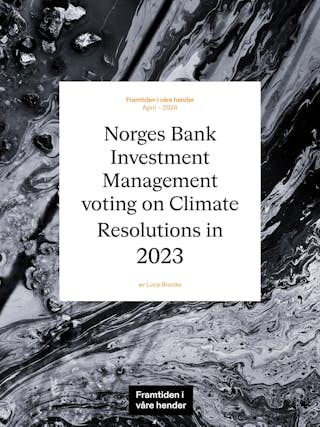Oil fund falls short on voting for climate action at oil and gas company AGMs
In 2023, the Norwegian Oil Fund (Norges Bank Investment Management, NBIM) failed to support climate resolutions and supported climate-harmful strategies at some of the world's largest oil and gas companies and banks financing fossil fuels, according to this report by Framtiden i våre Hender.

The oil fund is one of the largest global investors with more than $1.3tn assets under management (AUM) and is amongst the biggest shareholders in most of the largest, high-emitting global oil and gas companies.
The International Energy Agency (IEA) highlights the pivotal role that investors must play to limit global temperature rises to below 1.5 degrees Celsius and the oil fund is recognised as one of the “ten financial actors that can accelerate a transition away from fossil fuels.”
In its Climate Action Plan, the oil fund promises to use its considerable influence as a shareholder to encourage companies to set science-based emissions targets and disclose plans to achieve them. The companies’ annual general meetings (AGMs) provide an opportunity for investors like the oil fund to steer these companies toward climate action. However, analysis shows that NBIM has greatly lagged in seizing this opportunity.
This report examines the oil fund’s voting patterns in 2023 at 19 major company AGMs, finding that, during the first year of its Climate Action Plan the fund is falling short of expectations. Despite its own climate commitments, the fund continues to support key blocking industries (such as fossil fuels) more than its peers, revealing a gap between its stated objectives and actions.
Report
Norges Bank Investment Management voting on Climate Resolutions in 2023
This report examines the oil fund’s voting patterns in 2023 at 19 major company AGMs, finding that, during the first year of its Climate Action Plan the fund is falling short of expectations. Despite its own climate commitments, the fund continues to support key blocking industries (such as fossil fuels) more than its peers, revealing a gap between its stated objectives and actions.
